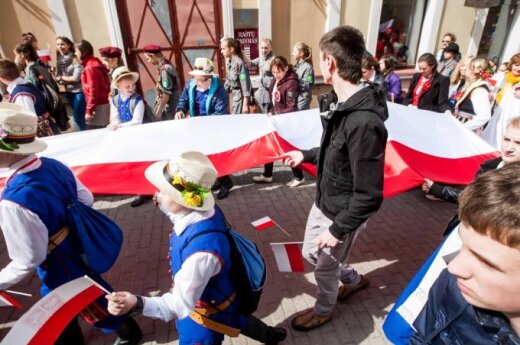- March 3, 2015
- 291
An open letter from the Federation of Kresy Organization to the Minister of Foreign Affairs Grzegorz Schetyna in reference to the issue of Poles in Lithuania

We enclose the whole letter.
Dear Mr Grzegorz Schetyna
The Minister of Foreign Affairs of the Republic of Poland
An open letter
Eleven questions
On the 23rd of February, you gave an interview to “Dziennik Gazeta Prawna” magazine entitled “A kilometer farther past Debaltseve and we are going back to sanction.” The interview concerns different issues referring to the situation in Ukraine. However, there is also a part about Polish-Lithuanian relations and the situation of Poles in Lithuania in it. Significantly enough, in an interview 1454 words long, you dedicate only 54 words, i.e. about 4% of the whole interview to that issue.
These are the words: “It is a provocation written into resentment, difficult relations, difficult history and local government elections. We talk about it with Lithuanians. We should seek that what can connect. We cannot feel offended all the time. We are the bigger nation, which poses a challenge on this matter. We should fight for the rights of Poles in Lithuania, but at the same time exact their elementary engagement into the Lithuanian statehood.”
It is a complicated matter, and difficult for the Polish politics. Obviously, the 6 sentences pronounced by Mr Minister do not explain a thing about this issue. However, they raise serious doubts about the directions taken by the Polish politics regarding Lithuania. We are going to express these doubts in the form of questions. Since the interview is widely available, we will pose the questions in the form of an open letter.
The first question:
– Asked about the provocation “with People’s Republic of Vilnius”, you associate it with “resentment, difficult relations, difficult history and local government elections.” Does it mean that – according to you – the provocation is caused by the Lithuanian Poles, or that the said provocation works out well for them?
The second question:
– Do the sentences “we talk about it with Lithuanians. We should seek that what can connect” mean that the topic of the current talks with Lithuania concerns the issue of provocation “with People’s Republic of Vilnius”, or that the topic concerns the Polish-Lithuanian relations in overall terms?
The third question:
– By saying “we cannot feel offended all the time”, did you mean to say that “feeling offended” is insisting on respecting the Polish-Lithuanian Treaty and the so-called Framework Convention for the Protection of National Minorities by Lithuania, or did you mean something else?… What exactly does this sentence mean?
The fourth and the fifth question:
– What did you mean by saying that “we are the bigger nation, which poses a challenge on this matter”? Could this mean that since Poland greatly surpasses Lithuania in terms of its potential (the population, the territory, the economy, the military), Poles in Lithuania should be freely discriminated?
– Do you think that since Poland negotiated, signed and ratified the Polish-Lithuanian Treaty guarantying the Polish people in Lithuania numerous rights, and managed to prolong it two times, does Poland have any specific responsibilities – solicitation is not specific – towards Poles in Lithuania? If yes, then what are these?
The sixth, seventh and ninth question:
– What does the sentence about “exacting the elementary engagement of Poles in Lithuania into the Lithuanian statehood” mean?
– On what basis do you imply there is no elementary engagement of Poles in Lithuania into the Lithuanian statehood? Or you repeat the theses of the anti-Polish negative campaigning?
– Does taking part in the political life (e.g. being in three coalitions in the government and local government; taking part in every public authority elections), the educational life (on all levels), the economic life and the artistic one not indicate the engagement into the Lithuanian statehood?… and even more than the elementary one?
– In what way Poland can exact anything from the Lithuanian Poles, when it cannot, or intend to exact anything from Lithuanians?
The tenth question:
– You claim that “we should fight for the rights of Poles in Lithuania”. Could you be more specific and tell what are the ways to fight for the rights of Poles in Lithuania, especially the effective ones?
The eleventh question:
– Don’t you think, Mr Minister, that such a complicated and difficult matter deserves more thoughtful, complex, measured, and at the same time precise statement?
Looking forward to your response
With kind regards,
PRESIDIUM OF THE SUPREME COUNCIL OF THE FEDERATION OF KRESY ORGANIZATION
THE VICE CHAIRMAN ADAM CHAJEWSKI
THE CHAIRMAN TOMIR SOŁTAN
Translated by Tomasz Szatkowski within the framework of a traineeship programme of the European Foundation of Human Rights, www.efhr.eu.

